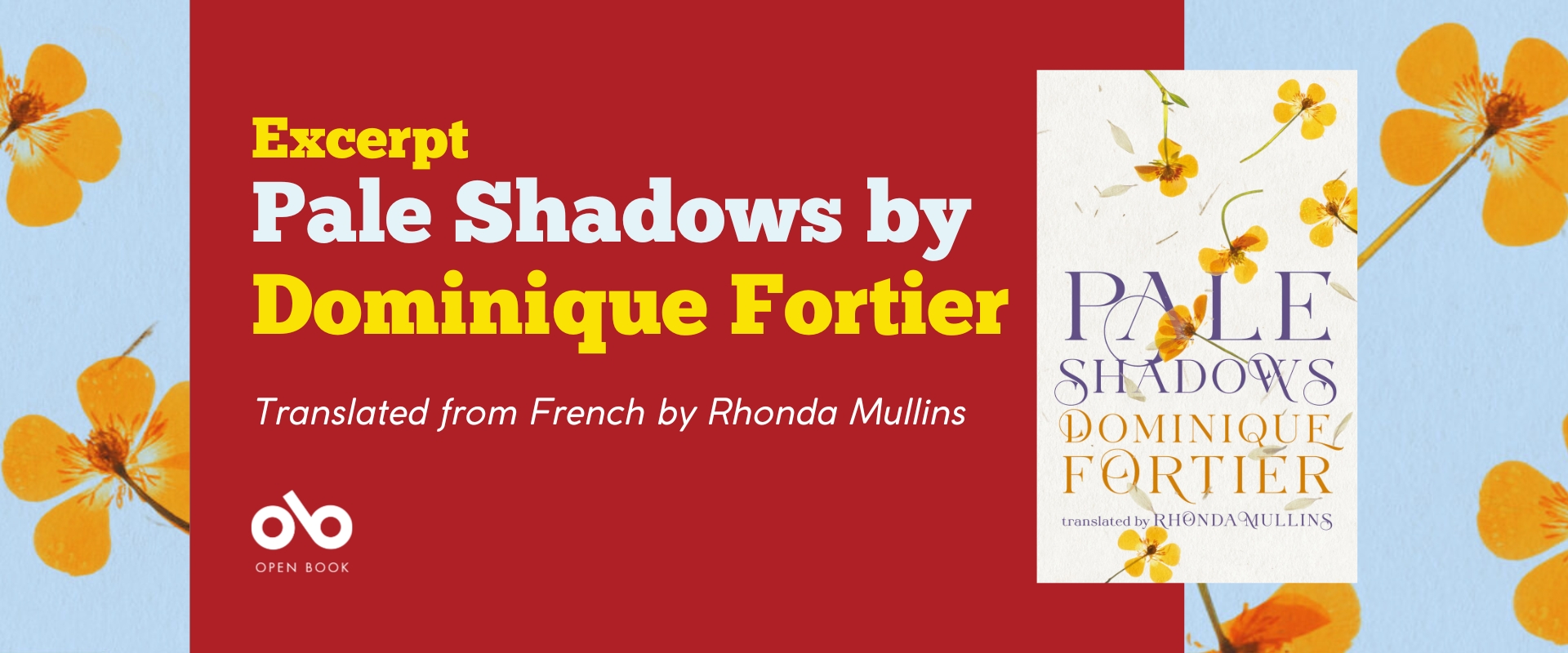Read an Excerpt from Pale Shadows by Dominique Fortier, Translated by Rhonda Mullins
What is the purpose of stories if they languish in the shadows? If they are written down only to wait by on paper in a drawer in the hope that someone, anyone, will pull them out and share them with the world.
In Pale Shadows (Coach House Books), Dominique Fortier tells the story of Lavinia, sister to Emily Dickinson, who finds her lost sister's poems and enlists the help of family and friends to ensure that Dickinson's words and stories are illuminated for the world to see. These women rouse themselves from grief and arrange the poems for a publisher, navigating a male-dominated literary world as they give their all of make a place for one of the great poets of our time.
Read this enthralling excerpt from Pale Shadows, translated into English by Rhonda Mullins, and explore the place of these women as they weave their way into storytelling history, all through Fortier's dark and delicate prose.
Excerpt from Pale Shadows by Dominique Fortier, Translated by Rhonda Mullins:
Lavinia stretches out between the sheets after having snuffed out all the lamps, put out the fire, closed the windows, and locked the doors. She is alone with Cinnamon and Pepper, who are too lazy to go outside and are stretched out beside her. She closes her eyes, forces herself to keep them closed; she counts: one, two, eight, twenty sheep, but sleep won’t come. She opens her eyes; the bedroom is plunged in darkness, the world has kept its shape but lost its colour. Is this how we see when we are dead? she wonders, just as she hears the floor groan at the other end of the hall, a faint but unmistakable noise, the sound of a floorboard creaking under someone’s – or something’s – foot.
She pricks up her ears, curious, but not remotely alarmed. Lavinia doesn’t really believe in ghosts, and she believes even less in robbers. Like her, the cats listen, their ears mobile, turning toward the source. Another floorboard creaks, and Lavinia recognizes the sound, about one step from the first, slowly advancing toward her: it’s Carlo, Emily’s dog, who died a few years before his mistress.
In the desk in Emily’s bedroom, the pen is deep in sleep, dreaming of the words it has left to write and invisible poems it traced in the sky when it was a goose on a long journey. It recognizes its luck; it has lived two lives.
The down mattress yearns for the weight of a body. It feels so light that it could fly away, one feather at a time, spreading in the ether like July clouds, dissolving like salt in water.
The ink has hardened in the inkwell. It turned to jelly, paste, then a puck; its cracked surface has greyed, covered with a velvety film like the skin of some mushrooms. It sits there, inanimate, a stone. It has returned to the mineral world.
The desk used to be a huge oak, with branches that touched the sky. It was home to families of birds and a gang of raccoons. On stormy evenings, it creaked in the wind like the mast of a ship. They started by cutting off the top; the highest limbs fell in a rustle of leaves, nests dislodged, fragile shells broken, then average-sized branches, and finally the fourth or fifth largest ones, as thick as a man’s torso. When all that was left was the trunk, it was carved up into large sections from which they cut the golden boards that became the desk. When it was done, all that remained was a stump on which the history of the tree, its one hundred and one winters, could be read in concentric circles. The desk misses winter. It would like to know snow one last time.
Your CanLit News
Subscribe to Open Book’s newsletter to get local book events, literary content, writing tips, and more in your inbox
Emily had told her several times to burn her letters and diaries, and Lavinia never thought she would disobey her. It was just that, so far, she had been unable to carry out her wishes. This morning, she pushes on the bedroom door, enters noiselessly, for a time is immobile in the sun streaming through the window. Pepper chooses the moment to slip between her legs and stretch out in the middle of a square of light outlined on the floor. Nothing has changed, but the silence isn’t the same. The room is filled with her absence.
She opens the bottom drawer of the mahogany chest of drawers: rolled stockings, petticoats, sleeveless chemises. All but the stockings are ghostly white. Nightshirts sleep in the second drawer, the third is home to handkerchiefs, collars, and a few scraps of lace. That is where the diaries sit, which she throws into the fireplace without a glance, like dead birds. A flame rises, almost white from the ardent light.
Once the diaries are consigned to the fire, it is the turn of the letters, piled in the second drawer from the top. Lavinia takes out the bundles tied with black, green, forget-me-not ribbons. Dried flowers, leaves, and clovers fall from the envelopes. She doesn’t open them. May they keep their secrets in the casket of their yellowed pages. But some come unfolded on their own, like morning glories at dawn, and then she reads, despite herself, the first words:
My dear Emily ...
Emily dearest ...
Dear lady of the House ... My love ...
She folds them back up quickly as if to prevent the words from flying away, scattering; she abruptly tosses them in the hearth. They make the reddest flames.
Then Lavinia opens the last drawer. This triggers an avalanche of scraps of paper, blown by an invisible storm. Pieces of torn envelopes, corners of flour bags, scraps of sugar packaging, paper remnants in which spices are wrapped, bits of lists, fragments of music scores all take flight like a swarm of seagulls. They spread the fragrance of cinnamon, chocolate, soap, and black pepper.
Lavinia grabs a scrap of paper, the first her fingers happen upon, where she can barely make out a few words – she would need her glasses – but she knows by instinct, suddenly, from the goosebumps that prickle the skin of her arms, that it’s a poem, just as one knows immediately, in putting one’s hand in the fire, that it is burning.
The scrap of envelope trembles between her fingers. Paper has never been so alive.
Her first impulse is to put everything back in the drawer. She feverishly collects the bits of paper, makes piles, and pushes them aside, but it is a lost cause; they seem to have multiplied, or the drawer has shrunk. The poems no longer fit in it, will not fit in it ever again – has anyone ever managed to send the snow back up to the clouds, lava back into the volcano, tears back into eyes?
Kneeling at the foot of the bed, she lifts the top of the camphor chest, like those in which girls collect items for their trousseau: chemises, tablecloths, sheets, handkerchiefs. Between the wood planks, Lavinia discovers dozens of handwritten booklets, each a few pages thick, their white pages sewn by hand with the same regular petit point used to suture flesh after a wound.
She opens the first with infinite care – it is like spreading ribs to reveal the red mystery beating below. The pages are filled with Emily’s fine handwriting, so pointed it is hard to read, bird tracks on a frosted surface. For a moment, Lavinia fears that the sheets will melt in her fingers. At the same time, she senses that this fragile snow will outlive her – that it will outlive them all.
_____________________________________________________
Excerpt taken from Pale Shadows by Dominique Fortier, translated by Rhonda Mullins. Published by Coach House Books. Original French copyright, Dominique Fortier and Les Éditions Alto, 2022. English translation, copyright Rhonda Mullins, 2024.
Dominique Fortier is an editor and translator living in Outremont, Quebec. Her first novel, On the Proper Use of Stars (2008), was nominated for a Governor General's Award, and Au péril de la mer won the Governor General's Award for French fiction. She is the author of five books, two of which have been translated into English.
Rhonda Mullins is a Montreal-based translator who has translated many books from French into English, including Jocelyne Saucier’s And Miles To Go Before I Sleep, Grégoire Courtois’ The Laws of the Skies, Dominique Fortier’s Paper Houses, and Anaïs Barbeau-Lavalette’s Suzanne. She is a seven-time finalist for the Governor General’s Literary Award for Translation, winning the award in 2015 for her translation of Jocelyne Saucier’s Twenty-One Cardinals. Novels she has translated were contenders for CBC Canada Reads in 2015 and 2019 and one was a finalist for the 2018 Best Translated Book Award. Mullins was the inaugural literary translator in residence at Concordia University in 2018. She is a mentor to emerging translators in the Banff International Literary Translation Program.






